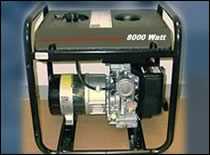Preventing Carbon Monoxide Poisoning After an Emergency
Highlights
- Generators, grills, camp stoves, or other gasoline, propane, natural gas, or charcoal-burning devices should never be used inside a home, basement, garage, or camper – or even outside near an open window.
- Every home should have at least one working carbon monoxide detector. The detector’s batteries should be checked at least twice annually, at the same time smoke detector batteries are checked.
Carbon monoxide (CO) is an odorless, colorless gas that can cause sudden illness and death if inhaled.
When power outages occur during emergencies such as hurricanes or winter storms, the use of alternative sources of fuel or electricity for heating, cooling, or cooking can cause CO to build up in a home, garage, or camper and to poison the people and animals inside.
Every year, more than 400 people die in the U. S. from accidental non-fire related CO poisoning.
CO is found in combustion fumes, such as those produced by small gasoline engines, stoves, generators, lanterns, and gas ranges, or by burning charcoal and wood. CO from these sources can build up in enclosed or partially enclosed spaces. People and animals in these spaces can be poisoned and can die from breathing CO.
How to Recognize CO Poisoning
Exposure to CO can cause loss of consciousness and death. The most common symptoms of CO poisoning are headache, dizziness, weakness, nausea, vomiting, chest pain, and confusion. People who are sleeping or who have been drinking alcohol can die from CO poisoning before ever having symptoms.
Important CO Poisoning Prevention Tips
-
 Never use a gas range or oven to heat a home.
Never use a gas range or oven to heat a home. - Never leave the motor running in a vehicle parked in an enclosed or partially enclosed space, such as a garage.
- Never use a generator, pressure washer, or any gasoline-powered engine inside your home, basement, or garage or less than 20 feet from any window, door, or vent.
- When using a generator, use a battery-powered or battery backup CO detector in your home.
- Never run a generator, pressure washer, or any gasoline-powered engine inside a basement, garage, or other enclosed structure, even if the doors or windows are open, unless the equipment is professionally installed and vented. Keep vents and flues free of debris, especially if winds are high. Flying debris can block ventilation lines.
- Never use a charcoal grill, hibachi, lantern, or portable camping stove inside a home, tent, or camper.
- If conditions are too hot or too cold, seek shelter with friends or at a community shelter.
- If CO poisoning is suspected, call 911 or your local Poison Control Center at 1-800-222-1222 or consult a health care professional right away.
Other Carbon Monoxide Resources
For educational materials, flyers, public service announcements, clinical guidance, and other resources, see Carbon Monoxide Poisoning After a Disaster.
- Page last reviewed: September 27, 2017
- Page last updated: September 27, 2017
- Content source:


 ShareCompartir
ShareCompartir

